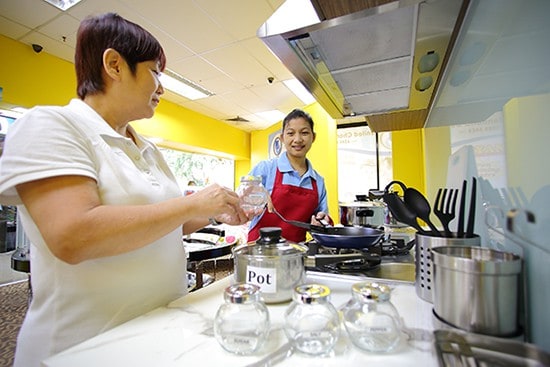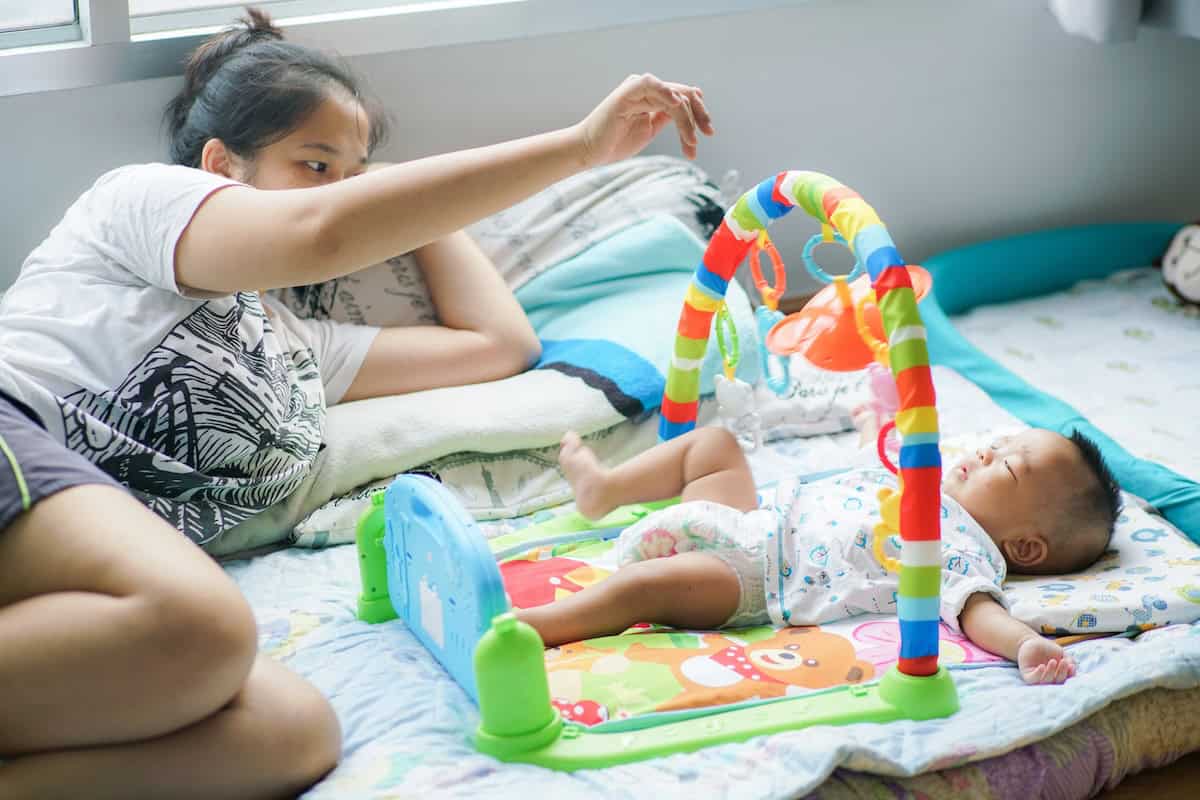Managing domestic helpers who care for the baby can be tricky. These may include different parenting philosophies, communication breakdowns and building mutual respect. Good management is key to both employer and helper feeling comfortable and valued in their roles.
Key challenges:
Clear Communication: You need to communicate your expectations and preferences.
Role Clarity: Distinguishing between personal parenting duties and delegated tasks to avoid overlaps.
Training Needs: Your helper needs to be trained in baby care to boost confidence and performance.
In this post, we’ll go through the key strategies for managing domestic helpers who care for your baby. By creating a positive working environment, you and your helper can both flourish in your caregiving roles and ultimately benefit your child.
Benefits of Hiring a Domestic Helper
Hiring a domestic helper offers numerous benefits for families. It frees up valuable time for family members to pursue hobbies, interests, and careers while ensuring a clean and organized home. With improved childcare and elderly care, stress is reduced, allowing family members to focus on their well-being. The helper’s flexibility in managing household chores creates a balanced home life. Ultimately, a domestic helper fosters a nurturing environment for children and family members, enhancing their quality of life and contributing to household happiness.
Understanding the Role of Domestic Helpers
Domestic helpers play a vital role in supporting family members with household chores, childcare duties, and other domestic responsibilities. They provide a nurturing environment that allows children, elderly, or disabled family members to thrive and live comfortably. A good domestic helper is a valuable asset to any family, offering emotional support, practical assistance, and helping to maintain a clean and organized home. Their contributions ensure that the household runs smoothly and family members can focus on their personal and professional lives with peace of mind.
Qualities to Look for in a Domestic Helper
When searching for a domestic helper, prioritize qualities that ensure excellent family care. Trustworthiness and reliability are crucial for managing household chores and childcare duties independently. Strong communication skills are vital for task execution. Patience and understanding are essential when dealing with children or elderly family members, while confidentiality and discretion protect family privacy. A willingness to learn and adapt, along with physical and mental stamina, ensures your domestic helper can efficiently handle role demands.
Tips on Managing Domestic Helpers Who Care for the Baby
Effectively managing domestic helpers who care for your baby is crucial for a harmonious home. This section offers practical tips and strategies to ensure a productive partnership. By setting clear expectations, defining roles, enhancing communication, and building trust, you can navigate the complexities of childcare and household management. A positive working relationship ensures your baby receives excellent care while maintaining a balanced, nurturing household environment.
For further insights, check out our article on the Top 10 complaints of Singapore parents with domestic helpers who care for the baby.
1. Set Clear Expectations
Setting clear expectations is important when managing domestic helpers who care for your baby. Having default preferences for daily routines helps create a structured environment for the helper and your baby. Consider writing down specific guidelines for:
Feeding: Feeding times, types of food, food allergies to be aware of.
Napping: Nap duration, nap location, soothing techniques.
Playtime: Activities and toys that stimulate development and are safe.
Writing down these expectations helps prevent misunderstandings and ensures consistent childcare. Having everything documented serves as a handy reference for both you and the helper, boosting their confidence by clearly outlining expectations. Hiring reliable, well-trained domestic helpers from a maid agency can further ensure your household’s needs are efficiently met.
Use simple language when writing these guidelines. Encourage your helper to ask questions or clarify specific tasks. This foundation builds a positive working relationship based on mutual understanding and respect.
2. Roles and Boundaries
Clear boundaries and roles is key to a happy relationship with your domestic helper. Reviewing the profiles of potential candidates and assessing them based on their experience and qualifications is crucial to ensure a good fit for your family’s needs. This clarity ensures smooth daily operations and a supportive environment for the caregiver and your baby.
Responsibilities
Start by identifying the parenting tasks you want to do yourself and those where you require assistance. Consider:
Bedtime routines
Feeding times
Bathing
Once you’ve decided on your personal tasks, outline the tasks you’ll delegate to your helper. This may be:
Diaper changes
Naptime supervision
Playtime activities
Overlaps
With defined roles, confusion can be avoided. In-laws can provide assistance and contribute to the household arrangements, particularly when parents are busy or working from home. When both parties know their tasks, overlap can be minimised. For example, if the helper is doing playtime, you can focus on bonding during feeding or bedtime routines.
Communication
Write down these boundaries and share them with your helper. Regular catch ups allow you both to discuss any changes or concerns that may arise about the tasks. A balanced approach benefits childcare and the household.
3. Training
Managing domestic helpers who care for the baby is more than just assigning tasks. A live-in helper offers a broader and more customizable job scope compared to part-time help. Investing in training programs boosts their skills and confidence and creates a nurturing environment for your baby. Consider enrolling your helper in professional infant care courses that cover:
Hygiene and safety: Best practices to keep the baby safe and healthy.
Feeding: How to feed, burp and recognize hunger cues.
Diaper changing and bathing: Step by step guide to keep the baby comfortable and clean.
First aid: Basic emergency response skills can be lifesavers in unexpected situations.
In addition to infant care skills, organisational skills are key. A structured approach allows your helper to manage their time well and balance childcare tasks with household chores.
Encourage them to create daily schedules so they don’t feel overwhelmed. This will not only increase their productivity but also the overall flow of the household so you and your helper can focus on what matters most – your baby.

4. Daily Schedules
A daily schedule is key to meeting both your baby’s needs and household efficiency. Here are some tips:
1. Baby’s Needs and Childcare Duties
Start the day by listing out the key activities – feeding, napping, playtime. This sets the rhythm according to your baby’s natural patterns.
2. Household Chores
Identify when the baby is napping or independent playtime. Schedule household tasks during these times to be more productive without sacrificing childcare.
3. Preparing Meals and Snacks
Preparing meals and snacks is an essential part of a domestic helper’s role. They should be able to plan and prepare healthy, nutritious meals that cater to the dietary needs and preferences of family members. This includes cooking, baking, and preparing snacks for children or elderly family members. A good domestic helper should also be adept at managing food allergies and intolerances, ensuring that all meals are safe and suitable for everyone. Maintaining a clean and hygienic kitchen environment is equally important, as it prevents foodborne illnesses and promotes overall health and well-being.
4. Encourage Planning Ahead
Get your helper to help create the daily schedule. This will give them a sense of ownership and accountability and better time management.
5. Visual Aids
Use charts or checklists to outline the day’s activities. Colour coded systems make it easier for your helper to track tasks and prioritise.
By doing this, you create an environment where childcare and household tasks coexist peacefully. A structured approach benefits your baby and the working relationship with your helper, which will make future interactions smoother.
5. Communication
Communication is key when managing domestic helpers who care for your baby. Open communication creates a positive working relationship and ensures everyone is on the same page for childcare.
Regular Catch Ups
Schedule regular meetings to discuss:
The baby’s progress
Daily routines and any changes
Issues or challenges that arise
These catch-ups give you and your helper a chance to share information and updates so care practices are aligned with your family’s needs.

Give Feedback
Giving feedback is important to improve performance. Focus on:
Specific examples of what the helper is doing well
Areas for improvement presented in a positive way
This will not only boost the helper’s confidence but also their growth in the role. Regular feedback sessions clarify expectations and reinforce good habits, creating a nurturing environment for the baby and caregiver.
Open communication creates relationships and better care for your child. Clear conversations make it easier to navigate the daily challenges together.
6. Trust and Relationship
Building trust with your domestic helper is important for good childcare. Trust building involves:
Show Appreciation
Acknowledge your helper regularly. Positive reinforcement boosts their confidence and motivation. Simple gestures like saying “thank you” or recognising specific tasks they do well go a long way in creating goodwill.
Cultural Sensitivity
Understanding that your helper is from a different culture is key. Different cultures have different childcare practices. Take time to explain your preferences while respecting their experiences. This mutual respect will bridge the gap and create collaboration.
Open Dialogue
Create an environment where both parties feel comfortable to discuss or share ideas about childcare practices. Open communication builds trust and better care for your baby.
Collaborative Goals
Get your helper to help set goals for your child’s development, such as milestones for feeding or sleep routines. When they are part of the decision-making process, it will strengthen their commitment and sense of responsibility.
A relationship built on appreciation and respect means better care for your baby and harmony in your home.
7. Safety Protocols and Monitoring Caregivers
Child safety should be a top priority for the domestic helper. Having clear safety protocols will be the framework for your helper’s daily routines. Here are the must-haves:
Never leave the baby unattended: This is during feeding, playtime or naptime.
Hygiene practices: Encourage frequent handwashing before handling the baby or preparing food.
Emergency procedures: Discuss how to handle different situations, like recognising signs of illness or distress.
Safe sleeping positions: Make sure your helper knows the recommended sleep practices to reduce risks.
Monitoring caregivers will reinforce trust and compliance with these protocols. Try these:
Regular check-ins: Observe your helper and the baby’s interaction and give feedback where necessary.
Routines documentation: Keep a log of daily activities that outlines adherence to safety protocols.
Open communication: Create an environment where your helper feels comfortable to discuss or ask questions about safety.
These will not only secure your child’s well-being but also create accountability and trust in your home.
8. Common Conflict Areas in Employer-Helper Relationships
Managing domestic helpers who care for the baby can create friction areas that affect the relationship. Knowing and addressing these common issues is key to a positive environment.
Common Problems
Settling into the Household: New helpers may take time to adjust to your family’s routines and expectations.
Chores vs Childcare: Confusion happens when responsibilities overlap and misunderstandings about priorities.
How to Improve
Open Communication:
Schedule regular check-ins to discuss challenges or concerns.
Get your helper to speak up about their feelings and observations.
Clear Roles:
Define specific tasks to be done by the helper versus what you will do personally.
Use written guidelines to back up what you’ve discussed.
Cultural Awareness:
Recognise the cultural differences that affect childcare practices.
Take time to explain your way while respecting their experience.
By addressing these friction areas you can improve your relationship with your helper and better care for your baby and your home.







